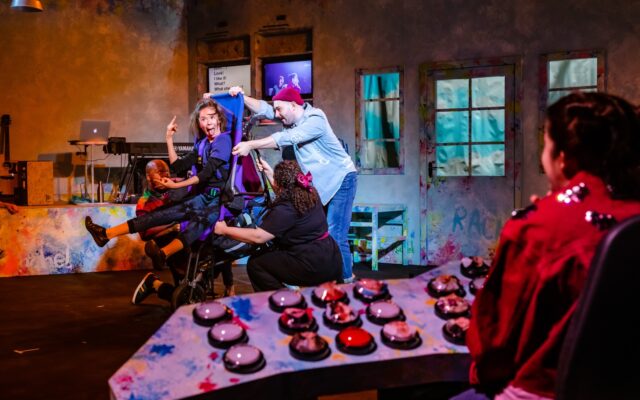A sell-out play starring Sarah Gordy tells the story of a young woman breaking free of the social and family constraints imposed by her disability. Tracey Harding takes a seat
Theatre for people with learning disabilities is a rarity and usually confined to small arts theatres. This is certainly not the case with Jellyfish by Ben Weatherill.
Jellyfish sold out at the Bush Theatre where it premiered in 2018. Having received widespread acclaim, it transferred to the National Theatre in July this year.
Part of its success can be attributed to actor Sarah Gordy recreating the main role of Kelly. Weatherill, who won the Pitch Your Play Award for young playwrights run by London’s Theatre Royal Haymarket and Curve Theatre Leicester’s Playwriting competition, wrote the part for her.
He was familiar with her work on TV and theatre, and Gordy was involved in the development of the play from the outset.
Jellyfish is the story of Kelly, a young woman with Down syndrome who lives in the seaside town of Skegness with her mother Agnes (Penny Layden). They have walked the same stretch of beach every day for 15 years, eating ice cream and hunting for crabs.
Their close relationship becomes strained when Kelly meets her boyfriend Neil (Ian Bonar), who does not have a learning disability. Kelly’s mum questions why Neil would be interested in her daughter; she worries about exploitation and Kelly’s abilities to deal with the emotional complexity of a relationship.
What Agnes is really struggling with are the ways that her daughter is maturing, and the realisation that Kelly does not need her in the same way as before. Weatherill cleverly shows her emotions are felt by all parents, regardless of the child’s ability or disability.
Some scenes highlight Agnes’s role as the mother of someone with Down syndrome. She has spent years caring for her daughter and understands that, while she has always seen Kelly as an individual, the rest of society makes assumptions and judgments on how she is expected to behave.
Sex and stereotypes
Exploring areas for people with learning disabilities that are often considered difficult or inappropriate is a thread that runs through the play.
Kelly defies the stereotypes of how people expect her to be as a woman with Down syndrome. She is extremely self-confident, and it is she who pushes the relationship with Neil forward, particularly the sexual side. Kelly seems determined to resist the social assumptions that people with learning disabilities are vulnerable, and brazenly asserts her sexual autonomy.
She swears like a trooper – she tells hilarious dirty jokes that make the shy, insecure Neil seem immature. When Neil is concerned about having sex in Kelly’s mother’s house, Kelly pipes up: ‘Do you hear that? It’s my virginity screaming ‘shut the fuck up!”
In an interview with Metro this summer, Gordy said how much she enjoyed playing the character of Kelly: ‘There is one thing that Kelly and I have in common, which is our sense of humour, but our lives are different because in mine there are more opportunities, which Kelly has not had.’
Showing further that he does not define his characters by their disability, Weatherill includes Dominic, who delivers the funniest lines but who also happens to have Asperger syndrome. He is played by Nicky Priest, who is himself on the autistic spectrum.
Kelly’s mother sets him up on a blind date with her daughter, but they end up as friends who openly discuss their disabilities and the way they shape how others judge them.
More challenging discussions arise in later scenes when Kelly falls pregnant, raising ethical questions about whether Kelly is capable of keeping the baby.
When interviewed at the Bush Theatre premiere, Weatherill said he wrote the play ‘because I’m really interested in putting voices and narratives in plays that we don’t usually see, and I want to be part of that conversation’. In Jellyfish, he has achieved an engaging, entertaining way of presenting those voices to a wider audience.
Jellyfish is on at the Leeds Playhouse on 28-30 November 2019




